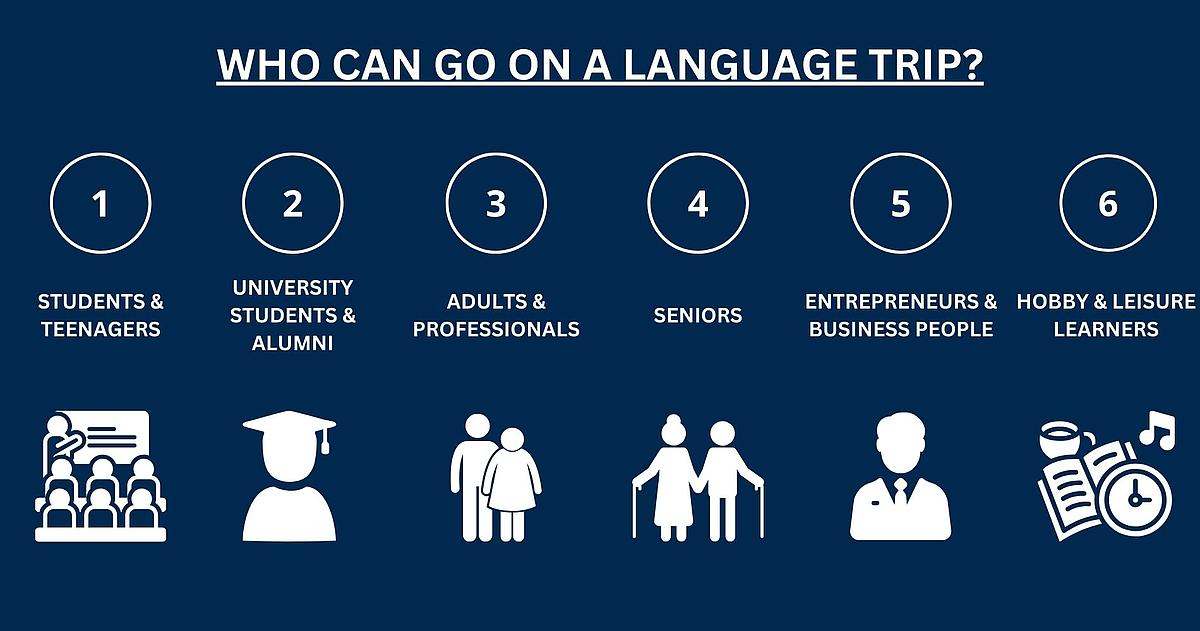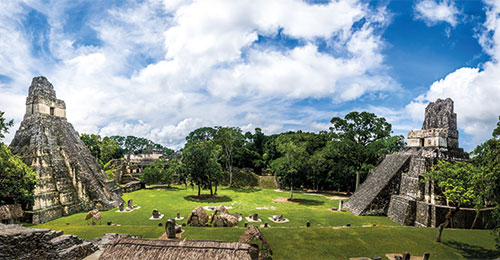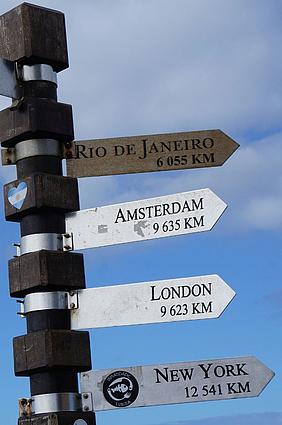This Website uses cookies to improve your visit on our website. More Info
Language Trips: Vacation, learn a language & experience culture!
Language Trips offer a unique and effective way to learn a new language while immersing yourself in the culture of the destination country. In this article, we take a closer look at the benefits of Language Trip, explain lots of information about it and give tips on how to get the most out of this enriching experience.
What is a Language Trip?
A Language Trip is a trip to a country where the language you want to learn or improve is spoken. The aim of such a trip is to intensify language skills through direct contact with native speakers and constant confrontation with the language in everyday life. Language Trips are typically organized programmes that combine language lessons with cultural and leisure activities. Participants attend language courses, often offered by specialized language schools, and take part in excursions and events that help them to better understand the culture of the host country and gain practical language experience.
Language Trips are aimed at people of all ages and language levels, from pupils and students to adults and business people. They offer an intensive learning experience aimed at rapidly improving language skills while developing a deep cultural understanding. They can last from one week to several months, depending on participants' goals and availability.
Advantages & Disadvantages of Language Trips
This table provides a clear overview of the positive aspects and potential challenges of Language Trips, which can help in the decision-making process.
| Advantages | Disadvantages |
|---|---|
| Improved language skills through immersion: Daily practice in real-life situations promotes fast and deep learning. | Costs: Language Trips can be expensive, including tuition, accommodation, travel costs, etc. |
| Deeper cultural understanding: Direct experience of the culture improves understanding of linguistic nuances. | Homesickness and cultural adjustment: Adjusting to a new culture can be challenging; homesickness is possible. |
| Personal development: Promoting independence, self-confidence and intercultural skills. | Language barriers: Initial difficulties in understanding and speaking can be frustrating. |
| Building international networks: Making friends and professional contacts worldwide. | Time commitment: A Language Trip requires a significant time investment, often several weeks to months. |
| Unique experiences and adventures: Opportunity to visit unforgettable places and try out new activities. | Security concerns: Security risks, especially in less stable regions. |
Requirements for a Language Trip
The requirements for a Language Trip can vary depending on the provider and program, but there are some general aspects to consider for almost all Language Trips:

- Language level: Many language travel programs are suitable for all language levels, from beginner to advanced. Language schools usually offer placement tests to place participants in the appropriate course levels. It is therefore not essential to have advanced language skills before taking part in a Language Trip.
- Age requirements: Some programs are specifically designed for certain age groups such as pupils, students, adults or seniors. It is important to choose a program that suits your age group.
- Passport and visa: Valid travel documents are a basic requirement. Depending on the destination country, a visa may also be required. Find out about the entry requirements in good time and start the necessary application procedures early.
- Health suitability: You should be physically and mentally fit to take part in a Language Trip. In some cases, a medical certificate may be required, especially if medical precautions need to be taken or the travel program is physically demanding.
- Financial means: Language Trips can represent a considerable investment. The costs usually include tuition, accommodation, meals, travel expenses and additional activities. It is important to know the total cost in advance and ensure that you have sufficient funds for the duration of the trip.
- Insurance: International health insurance is usually required, and it may be useful to also take out travel insurance that covers trip cancellation and interruption.
- Motivation and attitude: An open and flexible attitude is crucial to the success of a Language Trip. A willingness to engage with a new culture and actively participate in the language learning process can greatly enhance the experience.
Checking these requirements can ensure that the Language Trip is not only successful, but also an enjoyable and enriching experience.
If you are looking for alternatives to a Language Trip, but would still like to go abroad, then take a look at our pages on Internship Abroad, Semester Abroad and the more general overview page on Staying abroad.
To the Overview Page of the GuideWhat are the Circumstances of a Language Trip?
A Language Trip is not only an opportunity to learn a language, but also to experience a culture first-hand. The circumstances of such a trip can vary depending on the organization, destination and personal preferences. Here are some typical aspects to consider when going on a Language Trip:
Accommodation
The type of accommodation can vary considerably and often influences the overall Language Trip experience:
- Host families: many language students choose this option to fully immerse themselves in the language and culture. Living with a host family makes it possible to have everyday conversations and experience local customs.
- Student residences: These offer a more traditional college experience with the opportunity to meet other international students. They are often less expensive than other types of accommodation.
- Shared flats: This is where students share an apartment or house. This option offers more independence and is a good choice for those who already have experience of independent living.
- Private apartments: For those who want more privacy and independence, a private apartment may be the best choice, although this is usually the most expensive option.
Cultural Activities
- Many language schools offer organized excursions and activities to help participants learn more about the culture while practicing the language. These can include city tours, museum visits, theater performances or day trips to nearby attractions.
Transportation
- Public transportation: In many cities, the public transportation network is well-developed and language students often use buses, trains or subways.
- Bicycle: In bicycle-friendly cities, a bicycle can be a practical and healthy way to get around.
- Walking: In smaller towns or if you live close to the school, you can simply walk.
Meals
- Host family: Meals are often included, which is a great opportunity to try local dishes and get to know eating habits.
- Self-catering: In halls of residence or shared apartments, you can cater for yourself, which offers flexibility and the opportunity to practice cooking skills or cook with friends.
Study Requirements
- Language courses: Courses are often intensive and require regular attendance and completion of homework.
- Certificates and exams: Many programs end with an exam or the awarding of a certificate confirming the language level achieved.

These circumstances of a Language Trip should be taken into account when planning to ensure that the experience is both educational and enjoyable.

What is the difference between a Language Trip
and a normal language course?

Differences between Language Trip and Language Course
| Feature | Language Trip | Normal Language Trip |
|---|---|---|
| Environment | Full immersion in a linguistic environment | Language practice mostly limited to the classroom |
| Cultural experiences | Integrated cultural activities and excursions | Few to no cultural activities |
| Language use | Daily use in real life situations | Limited to classroom exercises and examples |
| Learning environment | Motivating through travel and cultural immersion | Often static and familiar learning environment |
| Target group | All ages, including students and adults | Often specific to certain age groups or purposes |
| Duration | Variable, from one week to several months | Mostly fixed duration, often repeating weekly |
| Practical interaction | Frequent interaction with native speakers | Mainly interaction with teachers and classmates |
The main difference between a Language Trip and a normal language course lies in the immersion and cultural context. This table helps to summarize the main differences between the two learning approaches at a glance and to illustrate the advantages of a Language Trip compared to a traditional language course. Overall, a Language Trip offers a more comprehensive and intensive experience that not only improves language skills, but also promotes deeper cultural insights and personal development.
Why is a Language Trip worthwhile?
Language Trip is worthwhile for several reasons, including both educational and personal benefits:

- Improved language skills: By constantly using the target language in real-life situations, language skills can be improved more effectively and quickly. Daily practice in an immersive environment helps to strengthen listening comprehension and develop speaking skills faster than in a traditional classroom.
- Cultural understanding: On a Language Trip, you not only learn the language, but also the culture of the host country. This deep cultural understanding is particularly valuable, as language and culture are inextricably linked. It enables learners to better understand and utilize linguistic nuances and cultural contexts.
- Practical application: Learners can use the language in everyday contexts, which helps them to improve their communicative skills. From ordering in a restaurant to navigating the city, all of these experiences build confidence in their own language ability.
- Personal development: A Language Trip challenges participants to step out of their comfort zone. This promotes independence and improves problem-solving skills. The experience of finding your way in a foreign country can also strengthen self-awareness and self-confidence.
- Building networks: On Language Trips, you meet people from all over the world who share the same interests. These contacts can lead to lasting friendships and valuable networks that can be beneficial both personally and professionally.
- Professional benefits: Language skills are highly valued in the global job market. The experience and ability to communicate in more than one language greatly enhances career prospects, especially in international professions or with companies that value cultural competence.
- Unique experiences: In addition to learning, a Language Trip offers the opportunity to gain unforgettable experiences, discover new places and live an adventure that goes far beyond the usual tourist stay.
In summary, a Language Trip offers a holistic learning and life experience that goes far beyond learning a language and can enrich you personally and professionally in many ways.
Who can go on a Language Trip?
Language Trip is basically open to anyone who wants to improve their language skills and experience a new culture at the same time. Language Trips offer a wide range of benefits for different target groups and can be a valuable experience for anyone who wants to improve their language skills and experience new cultures at the same time.
Overview: Groups that benefit from Language Trips
The following graphic provides a brief overview of the main groups that benefit from Language Trips.

Explanation: Groups that benefit from Language Trips
In short, a Language Trip can be suitable for people of all ages and from all walks of life who want to improve their language skills, experience new cultures and gain valuable life experience.
Students and Teenagers
Many programs are specially tailored to younger participants and offer a combination of language lessons and cultural and leisure activities. These trips can also serve as preparation for school language exams.
University Students and Alumni
For this group, Language Trips offer the opportunity to improve their language skills, which can be beneficial for their academic and professional future. Such experiences are often also useful for gaining international experience and making contacts.
Adults and Professionals
Whether for professional development or personal interest, Language Trips for adults are popular for improving language skills, furthering careers or simply taking on a new challenge.
Seniors
Older adults also use Language Trips to stay active and gain new learning experiences. Many providers have special programs that are tailored to the needs and interests of seniors.
Entrepreneurs and Business People
For professionals working or planning to work in international markets, Language Trips can be an effective way to acquire or deepen necessary language skills.
Hobby and Leisure Learners
For people who simply want to learn a new language for the fun of it, Language Trips are a great opportunity to do so in a supportive and immersive environment.
Which Language Trip is right for you?
Choosing the right Language Trip can be a life-changing decision that will not only benefit your language skills, but also your personal and professional development. To help you make this important decision, we've put together several top 10 lists that highlight the best Language Trip options based on different criteria. Whether you're looking for the ideal country or the best language, our lists offer valuable insights to help you make the most of your Language Trip.
TOP 10 most popular languages for Language Trips
The most popular languages for a Language Trip often reflect global economic, cultural and educational trends. These languages not only provide access to the respective cultures, but also open doors in the global business world and in international relations. The following table shows how language influences the choice of destination country and which countries are typically chosen for learning certain languages. It provides a clear representation of the options available to Language Trip students worldwide. Here are the top 10 most popular languages for a Language Trip, based on demand and global prevalence:
| Rank | Language | Popular countries for Language Trip |
|---|---|---|
| 1 | English | United Kingdom, USA, Canada, Australia |
| 2 | Spanish | Spain, Mexico, Argentina, Colombia |
| 3 | French | France, Canada (Québec), Senegal, Morocco |
| 4 | German | Germany, Austria, Switzerland |
| 5 | Italian | Italy |
| 6 | Mandarin Chinese | China, Taiwan |
| 7 | Japanese | Japan |
| 8 | Portuguese | Brazil, Portugal |
| 9 | Russian | Russia |
| 10 | Arabic | Egypt, United Arab Emirates, Morocco |
TOP 10 Language Trip Destinations
The selection of top language travel destinations may vary depending on the language and cultural interests you are looking for. The following destinations offer a combination of high-quality language schools, exciting cultural experiences and the opportunity to practise the language in an authentic context. When choosing a language travel destination, personal safety, the political stability of the country and the cost of living should also be considered. Each of these countries offers unique opportunities for Language Trip travelers, not only to learn the language, but also to immerse themselves deeply in the local culture. These are the TOP 10 most popular destinations frequently chosen by Language Trip travelers:

No. 10: Canada (Toronto, Vancouver, Montreal)
Offers a high quality of life and the opportunity to learn both English and French, depending on the region. Canada is known for its diverse landscapes, from dense forests to large cities. Toronto, Vancouver and Montreal offer a high quality of life and are particularly known for their friendly and cosmopolitan atmosphere.
No. 9: Australia (Sydney, Melbourne)
Offers English learners the opportunity to study in a relaxed and friendly environment while enjoying the natural wonders of Australia. Australia is known for its relaxed way of life, stunning natural landscapes and friendly cities. Sydney and Melbourne offer vibrant cultural scenes and are popular destinations for Language Trip students.


No. 8: China (Beijing, Shanghai)
Ideal for Mandarin learners who want to experience the rapid growth and traditional aspects of Chinese culture. China is a country with deep historical significance and rapid modern growth. Beijing and Shanghai are centers of Chinese culture and economy.
No. 7: Japan (Tokyo, Kyoto)
A fascinating choice for those who want to learn Japanese and immerse themselves in the unique Japanese culture. Japan offers a unique blend of traditional culture and cutting-edge technology. Tokyo and Kyoto are known for their temples, gardens and vibrant city life.


No. 6: USA (New York, San Francisco, Los Angeles)
Suitable for English learners who want to experience American culture in large metropolitan areas. The USA is a melting pot of cultures with a dynamic and diverse society. Cities like New York and Los Angeles are centers of fashion, entertainment and business.
No. 5: Italy (Rome, Florence, Milan)
Ideal for Italian learners and lovers of art, history and Italian cuisine. Italy is the heart of ancient history and Renaissance art. Cities like Rome and Florence offer incomparable cultural treasures and culinary experiences.


No. 4: France (Paris, Nice, Lyon)
An excellent choice for French learners who want to experience French culture, cuisine and lifestyle. France is the country of art, fashion and gastronomy. Paris attracts millions of visitors every year with its romantic charm and cultural richness.
No. 3: Spain (Barcelona, Madrid, Seville)
Perfect for those who want to learn Spanish while enjoying the vibrant Spanish culture and history. Spain is known for its vibrant culture, excellent cuisine and warm climate. Cities such as Barcelona and Seville offer impressive architecture and a rich history.


No. 2: England (London, Oxford, Cambridge)
Ideal for English learners who want to experience both traditional and modern cultural influences. England offers a fascinating mix of historical sights and modern cultural life. Educational institutions such as Oxford and Cambridge are world-famous and attract students from all over the world.
No. 1: Germany (Munich, Berlin, Hamburg)
Popular with those who want to learn German while exploring Germany's rich history and modern culture. Germany is known for its technological innovations and historical significance in Europe. Berlin, Munich and Hamburg are cultural hotspots with a vibrant art and music scene.


How long should a Language Trip be in order to achieve
effective learning success?

Length of a Language Trip
| Duration of stay | Description | Suitable for |
|---|---|---|
| Short-term trips | 1-3 weeks | Refreshing and improving existing knowledge, first immersion in the language and culture |
| Medium-term trips | 1-3 months | Acquire comprehensive knowledge, deeper cultural experiences |
| Long-term trips | 3 months to a year | Achieve fluency in the language, near-native competence in every day and technical communication |
| Individual factors | Variable according to personal schedules and learning goals | Adaptation to personal circumstances and specific learning needs |
| Intensity of the program | Depending on the design of the program, shorter stays can be very intensive | People who learn quickly and can complete a dense program |
The ideal duration of a Language Trip depends on various factors, such as your language goals, starting level, time available and financial resources. These are some general guidelines that can help you determine the optimal length of stay for effective learning outcomes. In general, the longer the stay, the more profound and lasting the learning outcomes. A longer stay gives you the opportunity to use the language regularly in different contexts and to develop your language skills comprehensively.
When is the best time for a Language Trip?
The best time for a Language Trip can depend on various factors, including personal circumstances, climatic conditions of the destination and cultural events. Here are some considerations that can help you determine the ideal time for your Language Trip:

- Personal schedules and commitments: Choose a time that fits well with your academic, professional or personal calendar. For students, the summer months or other vacation times are often a good choice to avoid conflicts with the school year.
- Weather conditions: Find out about the climate in the destination area at different times of the year. Some people prefer to visit destinations during the milder seasons to avoid extreme weather such as extreme heat or heavy rainfall.
- Costs: Travel costs can vary depending on the season. In the low season, both airfares and accommodation costs are often cheaper. This can be an important consideration, especially for budget travelers.
- Cultural events and festivals: It can be particularly rewarding to plan your Language Trip to coincide with important cultural events or festivals. This offers additional opportunities to experience the culture intensively and to use the language in a lively context.
- Program offerings: Some language schools offer special courses or programs at certain times of the year. Check the available course offerings and choose a time that offers special courses or activities that interest you.
- Personal preferences: Think about what time of year you enjoy the most and feel most productive. Some people learn better in a lively summer atmosphere, while others prefer the quieter environment of winter.
By taking these factors into consideration, you can determine the optimal time for your Language Trip that maximizes your learning experience while meeting your personal and financial needs.
How much does a Language Trip cost?
The cost of a Language Trip can vary greatly and depends on several factors, including the destination, the duration of the trip, the program chosen, the type of accommodation and additional activities. Here are some general cost points to consider when planning a Language Trip:

- Course fees: The fees for the language lessons themselves can vary depending on the school, country and intensity of the course. Intensive courses in popular languages such as English, French or Spanish in countries such as the USA, France or Spain can cost between 200 and 600 euros per week.
- Accommodation: Accommodation costs vary depending on the type of accommodation. Options include host families, shared apartments, student residences or hotels. Living with a host family, which also offers a more in-depth cultural experience, can cost between 150 and 350 euros per week.
- Meals: Some programs include meals, especially if you live with a host family. In other cases, you will have to pay for your own meals, which can increase the cost depending on the cost of living in the host country.
- Airfare: Travel costs depend on your home country and destination. International flights can vary considerably depending on the season and booking period.
- Visas and travel documents: Depending on the destination, visa and processing fees may apply. These costs and any costs for passports should not be underestimated.
- Insurance: International travel health insurance is often compulsory, and it may be useful to also take out travel insurance that covers trip cancellation and interruption.
- Leisure activities and excursions: Many Language Trips offer cultural and tourist activities, which can often incur additional costs.
- Additional fees: Books, materials, local transportation and personal expenses are also added.
On average, the total cost of a two-week Language Trip can range from around 1000 to 3000 euros, depending on the factors mentioned above. It is advisable to compare offers from different providers and possibly look for special packages or early booking discounts in order to optimize costs.
Affordable Language Trips for Students: How can a student finance a Language Trip?
For students looking to finance a Language Trip, there are various ways to ease the financial burden. By combining the following sources of funding, students can often significantly reduce the cost of a Language Trip and afford a valuable educational experience. Here are some approaches:
| Source of funding | Description |
|---|---|
| Scholarships and grants | Many organizations offer special scholarships for educational trips abroad, which can cover the costs of course fees, accommodation and travel. |
| Educational loans and credits | Educational loans offered on favorable terms to cover educational costs. Availability and conditions vary by country and provider. |
| Savings and part-time jobs | By saving early and working part-time, students can save money for their Language Trip. |
| Crowdfunding | Using platforms such as GoFundMe or Kickstarter to get financial support from friends, family and the public. |
| Early booking discounts and special offers | Many language travel providers offer discounts for early bookings or special offers at certain times. |
| Funding programs such as ERASMUS+ | Programs that offer financial support for educational stays abroad can also be used for language courses under certain circumstances. |
| Support from family and friends | Direct financial help or gifts of money collected on special occasions that can be used for the trip. |
How can I best benefit from a Language Trip learning experience?
To make the most of your Language Trip and get the most out of the learning experience, there are several strategies and tips you can follow:
- Active participation in class: Get actively involved in language lessons, ask questions and take part in discussions. The more active you are in the classroom, the more you will learn.
- Daily language practice: Take every opportunity to speak the language outside the classroom. Practice with locals, other students and host families. The more you use the language in everyday life, the faster you will make progress.
- Immersion in the culture: Immerse yourself in the culture of the host country. Visit local markets, museums, theaters and other cultural events. Cultural understanding deepens your linguistic understanding considerably.
- Homework and additional exercises: Use additional resources such as language learning apps, books, movies and music in the target language to supplement and deepen your learning.
- Keep a diary: Write regularly in the target language about your experiences and progress. This not only helps with writing, but also with processing new information and reflecting on what you have learned.
- Network: Make contact with other language learners and native speakers. This can not only improve your language skills, but also open doors to new friendships and professional opportunities.
- Attitude and motivation: Go into your Language Trip with an open and positive attitude. Be prepared to make mistakes and learn from them. Motivation to learn and improve is crucial for success.
- Regular self-assessment: Regularly review your progress and set yourself new language learning goals. This will help you stay motivated and continuously adapt your learning process.
By following these tips, you can ensure that you take full advantage of your Language Trip and achieve a deep and lasting learning experience.
Similar Study Guide Topics:
Internship Abroad
Semester Abroad
Staying Abroad
Learning Types
Study Strategies
FAQ
The question of the best Language Trip provider depends heavily on individual needs and preferences. Popular providers such as EF Education First, Kaplan International and Sprachcaffe are known for their wide range of languages and destinations. They offer high quality tuition and additional services such as accommodation support and cultural activities. However, it is important to consider the specific requirements and goals of the Language Trip and research reviews and feedback from past participants to find the provider that best suits your personal learning goals.
Yes, a Language Trip can count as educational leave if it is recognized as such by the relevant authorities in the country in question. In many countries, including Germany, employees can apply for educational leave to attend work-related language courses. This allows them to take time off work while attending an officially recognized language course without losing pay. Recognition as educational leave depends on the respective state legislation and requires that the language courses meet certain criteria.
The UK, USA, Canada, Australia and New Zealand are particularly popular destinations for an English Language Trip. These countries not only offer high quality language teaching, but also a rich cultural experience and the opportunity to practice the language in a natural environment. Cities such as London, New York, Sydney and Toronto attract thousands of Language Trip students every year and offer programs for all ages and language levels.
The cost of Language Trips for adults can vary considerably depending on the destination, length of stay, type of accommodation and services included. In general, prices can range from around 500 euros for a one-week trip to European countries to several thousand euros for longer stays in more distant destinations such as the USA or Australia. These costs typically include language lessons, accommodation and sometimes meals and additional activities. Flight tickets, visa fees and personal expenses are usually not included.
The cost of a Language Trip to the USA depends on various factors such as the length of stay, the type of accommodation, the location of the language school and the services included. In general, the cost of a two-week Language Trip can range between 1,500 and 3,000 euros. For longer stays of several months, the costs can be significantly higher and amount to 5,000 euros or more. These estimates usually include tuition, accommodation and some activities, but not always meals, flight tickets and personal expenses.
Interested in a Study Program? Request our Information Material now!
More exciting Degree Programs in Munich













